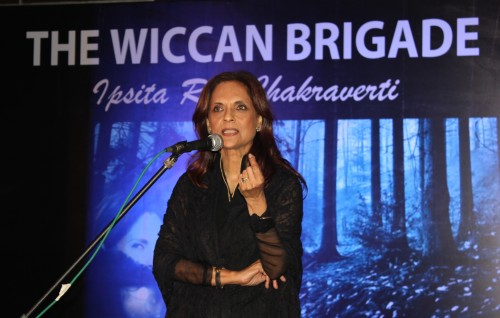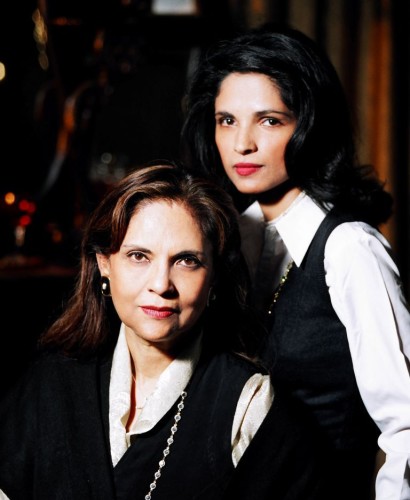When reporting on witchcraft in India, journalists must invariably tell the tragic tale of accusations, persecution and extreme violence. However, there is another side to the practice of Witchcraft, more specifically Wicca, in the country. While most of the victims of witchcraft-related crimes are not actual practitioners, there are Witches and Wiccans thriving in India’s unique and rich culture.
The Wild Hunt spoke with Ipsita Roy Chakraverti, arguably India’s most well-known and public Witch. She answered questions about her own journey and about living in a society that struggles with real witchcraft violence. Aside from being a Wiccan priestess, Ipsita is an author and the founder of The Wiccan Brigade of India and The Young Bengal Brigade, based in Kolkata.

Ipsita Roy Chakraverti [Courtesy Photo]
During that time, Ipsita met the “the enigmatic Carlotta,” a lawyer and “scholar of the esoteric and ancient traditions of the world.” Carlotta was involved in a private women’s study group of ancient religions. After a series of interviews, meetings, and discussions, Ipsita was allowed into this somewhat secret society.
Ipsita remembered, “The room in Carlotta’s house in Lachine would have the glow of lamps and velvet drapes drawn close. There, we would study and delve into ancient esoteric traditions of the world. We would research and discuss subjects as diverse as Taoism, the Jewish traditions, Egyptian magic, Celtic lore and much more. It was like stepping through a portal and into a monastery from another time, another place. It was there that I going was first introduced to the subject of [Witchcraft].”
Her parents were very supportive in Ipsita’s spiritual quest for knowledge. She studied at the chalet “hidden in the Laurentians.” For periods of time, she said, “We’d be living the monastic life. The chalet seemed to me to be set at a special power spot. It was surrounded by the elements, and by nature … I still recall vividly the room of a thousand crystals, which Carlotta had shown me. And I recall the beauty and depth of my own initiation there.”
![Ipsita leading a group of Psychic Investigators [Courtesy Photo]](https://wildhunt.org/wp-content/uploads/2015/09/Pix-Moumita-Kar-1-500x301.jpg)
Ipsita leading a group of Psychic Investigators [Courtesy Photo]
Over the following years, she continued her practice and studies and eventually began using the word ‘Wicca.’ As time went by, her work became more public. She began writing and was often interviewed by India’s media. Through that work, Ipsita took up the crusade to empower India’s women. In a 1994, she told a Delhi Mid Day reporter, “I want to awaken the witch in every woman.”
By the 1990s, Ipsita was directly addressing India’s witchcraft-related violence problem and the reality of women being “branded ‘daayans’ or witches.” In an essay for the Hindustan Times, she wrote, “Wicca and Witchcraft are the key to liberation.” Her religious beliefs and practice were, and still are, interwoven with a dynamic feminist spirit.
Ipsita explained, “India is very patriarchal, even today. When they saw me, standing up for those they were trying to brand and destroy, and saw that I was helping these women by calling myself a ‘witch’, these lobbies erupted with fury. These were vested interests which could not tolerate me because I was saying that a woman who was an individual had her own rights.”
Because of Ipsita’s social status, these “lobbies” couldn’t touch her, which only caused more friction. She said, “In India, class and background still count.” Using her social privliege as leverage, Ipsita was able to “show up” the motives behind the witch hunts, whether caused by gender inequality, ageism, property ownership, vendettas or sexual advances. Ipsita added that she also wanted to demonstrate that “superstition is a very carefully cultivated industry” and there are many who “gain from it – money, property, ego, power.” She said, “I was unmasking them.”
While working on these varied socio-cultural problems, Ipsita was also teaching her Wiccan tradition and building her personal practice. We asked her specifically about that tradition and how Indian culture or the Hindu religion informs it. She first said, “I follow a tradition which encompasses the goddesses of all cultures, east and west. After all, the Wiccan tradition spans something which is beyond barriers of land and people.”
![[Courtesy Photo]](https://wildhunt.org/wp-content/uploads/2015/09/DSC7759-500x332.jpg)
[Courtesy Photo]
Ipsita approximates that there are around 5000 Wiccans across India, both men and women. Through her own groups, she teaches “the culture of the great goddesses of the world [and] the tools of Wicca.” She added, “Most of all, I teach them what was ingrained into me – the attitude. The way of life. Of how one deals with the ups and downs of life. It is something monastic and something beautiful. And yet one lives in the normal, everyday world, going about one’s business. One learns to make a success of that too. A strange contradiction perhaps … I believe it is in us to achieve the ‘super-mind’ as taught by great Indian mystics like Shri Aurobindo,– to be a super-breed among men and women.”
As a child back in Canada, she was introduced to Witchcraft not as a structural religious institution taught within a hierarchical organization, but more of a way and or a method. She said, “I come from a world … when the name and the word ‘Teacher’ was enough. When Wicca was taught and passed on from a handful of teachers to their students. It was partly an oral tradition, and partly through the study of old parchments and books. And a lot of it was experience – of the power in rocks and earth, or the sacred forces which can come alive, and much more. My teachers were not those who were looking to run a Pagan organizations. They wanted perhaps only that some of their knowledge should pass on to a few of the next generation. That the ancient ways should not die out with them.”
Ipsita explained that she is like that in many ways. However, facing the socio-cultural issues within India, she felt “forced” to create an organization. In 2006, she formed The Wiccan Brigade. However, Ipsita still refuses titles and only wants to be known as a teacher. She said, “We delve into the old ways and mystical learnings, old texts and writings from different cultures. It is a path, where the teacher-student relationship is important, like the Indian “gurukul” system of old. The student learns from life and the ways of the teacher, and not just book learning. Ours is a blend of both the eastern and western systems – passing on the old knowledge.”
Over the years, Ipsita has written a number of articles, essays, and books, including Spirits I Have Known, Beloved Witch and Sacred Evil. She has appeared in several movies including a 2006 Bollywood film called Sacred Evil based on her book of the same title. In 2011, her story was featured in a telefilm called Mannequin. And, a third film, Loving Doll, is currently being produced, which is also based on her true-life stories.
Appearing with Ipsita in Mannequin is her daughter Deepta Roy Chakraverti. Like her mother, Deepta is also a Wiccan practitioner, and is publicly open about her practice. Deepta is the general secretary of the Wiccan Brigade and has studied both mathematics and law. This summer Deepta released her own book titled, Bhangarh to Bedlam: Haunted Encounters.

Ipsita with her daughter Deepta Roy Chakraverti
Ipsita said, “I have taught [Deepta] to learn from the world around her. As my own teacher had once told me, ‘life is the greatest school,’ so I have taught her. She studies the texts and subjects which are part of our Wiccan curriculum. She has an enquiring mind which enjoys delving into the why’s and wherefore’s of things, and to not take things at face value. I have taught her to align herself with the forces and elements around us, for they have much to teach. She lives with an attitude which is that of strength and independence.”
Ipsita’s journey is not yet over. Over the years, she has garnered support from the “highest echelons” of Indian society and politics in her “fight against the misuse of the term witch.” She said, “The goal is not yet reached because our women still suffer at the hands of a male dominated society and are tortured. My goal will be reached when I can show the perpetrators of crimes in the name of ‘witchcraft’ that every strong woman is a witch …”
Despite those struggles, Ipsita remains hopeful looking back on all of what she has already achieved. She said, “Today, I have the Wiccan Brigade which receives so many applications every day from men and women, of all ages, who want to be a part of the movement … But perhaps my greatest satisfaction all said and done comes from seeing how my detractors have fallen by the wayside. Today, I write books which become best sellers. Today, what I say counts.” Her voice is being heard.
The Wild Hunt is not responsible for links to external content.
To join a conversation on this post:
Visit our The Wild Hunt subreddit! Point your favorite browser to https://www.reddit.com/r/The_Wild_Hunt_News/, then click “JOIN”. Make sure to click the bell, too, to be notified of new articles posted to our subreddit.
“every strong woman is a witch” – really? Ronda Rousey is a witch?
With many of the travesties I have read and heard about in relation to India, I am glad to hear about the people who fight back. I am also glad to hear that someone who has a lot of influence on the people is using it too right the wrongs. I hope to hear more in the future from her and her daughter.